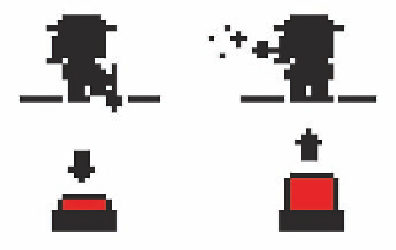Game Development Reference
In-Depth Information
range of human motions and allow us to force the player to perform a scooping motion to dig
through a floor. But even if we explore
a wider distance between physical interaction and game
representation—if we've restricted the input to a single button—there's a range of physical
action we can connect to our game verb.
The player makes Jane dig in
To mb ed
by tapping a key. How does Jane dig? A single, fast tap, a
poke of the earth with her shovel. A quick action that mirrors the player's key-press. What if the
player
tapped
the button and Jane slowly dug her shovel into the earth, pressing it down with
her foot, and then threw the dirt over her shoulder? There'd be a dissonance there that would
make the player feel less of a connection to the verb she was performing.
That's not to say you would never make a game where digging was slow and time-consuming:
digging
is
a slow task. But if you designed a “dig” verb that functioned like that, you would also
want to design a physical layer to the verb that would better describe it. Maybe the player has
to hold the button down while Jane is pressing the shovel down into the earth. Maybe she
throws the dirt over her shoulder when the player releases the button (see Figure
2.9
).
Figure 2.9
Verbs mirroring physical button activity.
In fact, the latter is especially compelling because it's dense: we've mapped two parts of a verb
to a single button. We've mapped the different steps of a sequence—jam the shovel in, and
then lift it over your shoulder—to two different physical actions that can be performed with the
same button: holding it down and letting it go. By compressing as many verbs as possible into
as small a physical layer as possible—in this case, as few buttons as possible—we're potentially
avoiding a lot of player confusion and fumbliness.
When I play a game that uses three or four different, adjacent keyboard keys, my fingers have
a hard time remembering which one is which, resulting in a lot of mispresses—which usually
means spending crucial resources by accident or misperforming an important choice. It means
a player who feels cheated. The only exception to this multikey problem is with a keyboard's
arrow keys, which, like the multidirectional joypads of game controllers, have been designed
and arranged with a physical metaphor in mind already! It's no wonder so many games use the
arrow keys as controls—it's a handy shortcut.


